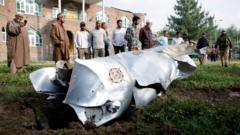In a significant escalation of tensions, Israel launched an airstrike on the southern suburbs of Beirut, where Iranian-backed Hezbollah operates. This strike, which took place on Sunday, came despite an ongoing ceasefire that was established to end previous hostilities between the two parties. Israel claimed to have targeted a site where precision-guided missiles were being stored, citing a direct threat to its national security.
Israel Strikes Beirut, Tensions Rise Amid Ceasefire Breach

Israel Strikes Beirut, Tensions Rise Amid Ceasefire Breach
Israeli airstrikes target Hezbollah-controlled areas, triggering international concern over escalating violence.
According to Israeli sources, the military operation aimed to neutralize a Hezbollah facility they argue violates the ceasefire terms. The Lebanese presidency swiftly condemned the strike, urging the United States and France—who were instrumental in negotiating the ceasefire—to intervene and halt further attacks. This latest offensive is particularly alarming as it is the first airstrike in nearly a month targeting the Dahieh neighborhood, a Hezbollah stronghold.
Reports suggest that the Israeli military has conducted regular operations against perceived Hezbollah threats, raising concerns within the international community. Western officials, speaking anonymously, noted that while Hezbollah has largely adhered to the truce, Israel has engaged in multiple violations, including air strikes.
Live images captured from the scene showed extensive smoke emanating from the explosion site shortly after Israeli forces ordered nearby residents to evacuate. Fortunately, Lebanese Civil Defense reported no casualties, although they rushed to extinguish the resultant fires.
Lebanese President Joseph Aoun voiced strong disapproval of the Israeli actions, emphasizing the need for the international community to ensure that Israel respects the terms of the ceasefire. "Israel's continued militaristic pressure undermines stability in the region," he stated.
Israel defended its operation, asserting that the storage of missiles posed a significant risk to its civilian population and clarified its stance with a firm statement outlining the necessity of its military actions. Israeli Prime Minister Benjamin Netanyahu echoed this sentiment, insisting that Hezbollah would not be permitted to consolidate its power unchallenged.
Furthermore, the UN's Special Coordinator for Lebanon raised alarms about the societal impact of the strike, highlighting fears of a return to conflict in a region already on edge. Earlier this month, an Israeli airstrike in these same suburbs resulted in casualties, including a high-ranking Hezbollah member.
As tensions escalate, the international community watches closely, fearing that a deterioration of the fragile ceasefire could plunge Lebanon back into turmoil.
Reports suggest that the Israeli military has conducted regular operations against perceived Hezbollah threats, raising concerns within the international community. Western officials, speaking anonymously, noted that while Hezbollah has largely adhered to the truce, Israel has engaged in multiple violations, including air strikes.
Live images captured from the scene showed extensive smoke emanating from the explosion site shortly after Israeli forces ordered nearby residents to evacuate. Fortunately, Lebanese Civil Defense reported no casualties, although they rushed to extinguish the resultant fires.
Lebanese President Joseph Aoun voiced strong disapproval of the Israeli actions, emphasizing the need for the international community to ensure that Israel respects the terms of the ceasefire. "Israel's continued militaristic pressure undermines stability in the region," he stated.
Israel defended its operation, asserting that the storage of missiles posed a significant risk to its civilian population and clarified its stance with a firm statement outlining the necessity of its military actions. Israeli Prime Minister Benjamin Netanyahu echoed this sentiment, insisting that Hezbollah would not be permitted to consolidate its power unchallenged.
Furthermore, the UN's Special Coordinator for Lebanon raised alarms about the societal impact of the strike, highlighting fears of a return to conflict in a region already on edge. Earlier this month, an Israeli airstrike in these same suburbs resulted in casualties, including a high-ranking Hezbollah member.
As tensions escalate, the international community watches closely, fearing that a deterioration of the fragile ceasefire could plunge Lebanon back into turmoil.





















